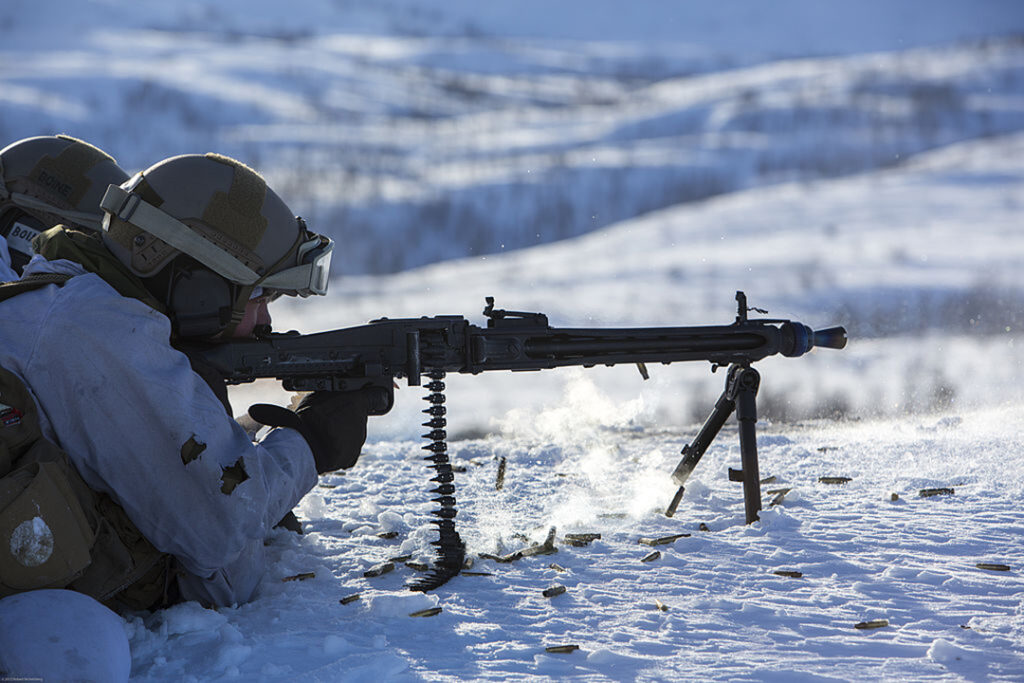NORWEGIAN ARMED FORCES
Nearly half of Norway’s land mass is Arctic territory, home to just one-tenth of the country’s population. Norway has a 198-kilometer-long land border with Russia and a substantial maritime border with adjacent international waters and airspace, which naturally results in day-to-day contact with the Russian Federation. For Norway, therefore, foreign and domestic policy converge in the Arctic. Norway’s policy revolves around security, stability, predictability and interest-based international cooperation. In short, “High North – Low Tension.” Peace in the Arctic is one of Norway’s most important foreign policy goals.
Russia’s military modernization and increased activity in the north create a challenging situation. New military capabilities have strengthened Russia’s response capacity and enhanced its ability to strike targets over longer distances with greater precision. Russia’s use of the new generation of strategic submarines, new missile programs and the revival of the bastion defense concept — aimed at protecting its strategic capabilities regarding the Greenland-Iceland-UK (GIUK) Gap — could have major implications for NATO’s ability to keep the lines of communication across the North Atlantic open.
Russia’s military buildup and military modernization challenges the security of Norway and other allied countries. As a result, the United States and other allies are showing a larger interest in increasing their presence in the High North to monitor Russian developments. Norway welcomes allied activity and presence, including in the Arctic. Norway’s security and defense policy is based on the guarantee or support from allied countries in the event of war or crisis. This support requires knowledge of the region and of what is needed to operate there. It is essential that Norwegian and allied forces train and conduct exercises both in and close to Norway. In March, together with 26 allies and partners, Norway conducted exercise Cold Response 2022. With 30,000 Soldiers, it was the largest military exercise in any NATO country. NATO is the cornerstone of Norway’s security, and its defense and deterrence policy is based on effective national defense and the guarantee of allied reinforcements. (Pictured: A Norwegian Army Soldier participates in a live-fire exercise in Skjold, Norway, north of the Arctic Circle.)
International law applies in the Arctic just as it does elsewhere in the world. The United Nations Convention on the Law of the Sea (UNCLOS) provides the fundamental framework for environmental protection, research, the delimitation of the outer limits of the continental shelf and shipping. To achieve the Arctic states’ common goal of maintaining stability and predictability in the region, all states must respect international law. Most global treaties and instruments apply in the Arctic. Norway supports cooperation with non-Arctic states based on respect for international law and within the framework of existing cooperation structures.
Bilateral, regional and multilateral cooperation with our neighbors and partners in the Arctic is important. The Arctic Council, the Barents Euro-Arctic Council, the Council of Baltic Sea States, the Northern Dimension and the European Union’s cross-border programs provide a solid architecture for dialogue and practical cooperation. The Arctic Security Forces Roundtable (ASFR) is also an important military community that brings real operational challenges, situational awareness and the possibility for cooperation to the table.
Climate change in the Arctic affects countries both in and outside the region. NATO foreign ministers endorsed a Climate Change and Security Action Plan on March 23-March 24, 2021. In the NATO Summit of June 2021, climate change was seen as a “threat multiplier that impacts allied security” and may create harsher conditions for operation.
Climate change likely will make it harder for military forces to carry out their tasks due to greater temperature extremes, sea level rise, rapid changes in precipitation patterns, and the increasing frequency and intensity of extreme weather events. Also, melting ice has increased the sea territory for Norway’s naval presence in the Arctic. Furthermore, the opening of new shipping lanes may influence the behavior of national governments that increase instability and competition. NATO will assess how climate change might affect its deterrence and defense posture, including readiness, enablement, reinforcement and military mobility.
In 2022, the Norwegian Defence Research Establishment (FFI) will start a research study on how climate change will affect military operations.
AFP/GETTY IMAGES

